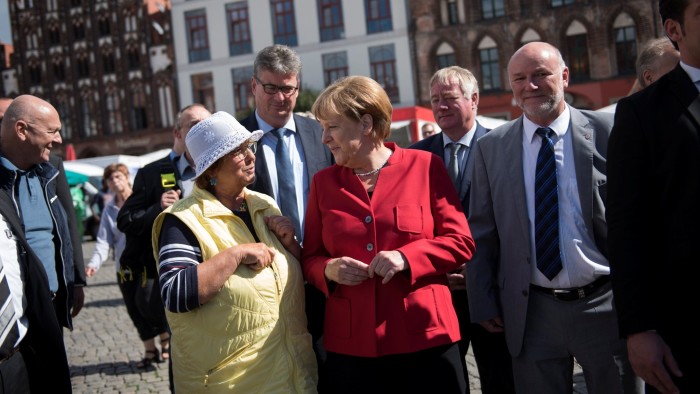Merkel acknowledges breakdown of trust after election setback

Simply sign up to the German politics myFT Digest -- delivered directly to your inbox.
In her decade in office, chancellor Angela Merkel has repeatedly won elections with the simple motto: trust me.
But Sunday’s vote in her home region of Mecklenburg-Vorpommern has stretched that trust to breaking point. Voters angry with her controversial refugee policy abandoned the established parties, including her conservative Christian Democrats (CDU), in droves and backed the anti-immigration rightwing Alternative for Germany (AfD).
“We must all think hard about how we can now win back trust again,” said a tired-looking chancellor, speaking in China at the end of the G20 Summit. “And of course, in the first place that means me . . . I am the party chairman, I am the chancellor.”
But even her own party faithful wonder how much of that trust she can recover, given how far the government’s unpopular open-door refugee policy has become her personal crusade. A once impregnable leader who had a popularity rating of 75 per cent in early 2015, before the refugee crisis broke, is now on 44 per cent, her lowest in five years.

“It’s a fundamental change when the chancellor herself comes under attack so much,” says a senior CDU MP. “There is a feeling that without her things would not improve [for the party]. But you have to ask how long she can go on when she is so divisive.”
The defeat in the region where the chancellor has her parliamentary seat, marks a new low in 62-year-old Ms Merkel’s struggle to retain public backing. AfD leader Frauke Petry celebrated saying: “Ms Merkel is bringing herself down.”
The AfD, formed only in 2013, took 20.8 per cent of the vote, winning support from other parties and bringing out non-voters, helping to raise the turnout from 51.5 per cent to 61 per cent.
The CDU, meanwhile, fell from 23 per cent in 2011 to 19 per cent, their worst result yet in the state. The SPD fared somewhat better than had been forecast but still plunged from 35.6 per cent to 30.6 per cent
In the ruling coalition, the most strident demands for change came from the Bavaria-based CSU, which has long criticised Ms Merkel and called for refugee limits and tougher border controls.

Bavarian finance minister Markus Söder, a CSU hawk, demanded a “change of course” and said: “The feelings of the citizens cannot be ignored any more.”
Sceptical CDU MPs in the party’s influential grouping for small and medium-sized companies were due to meet on Monday to discuss the election result. The group has repeatedly echoed the CSU in calling for tougher action.
Meanwhile, the social democrats, Ms Merkel’s coalition partners, are stepping up their assaults, capitalising on the fact that they did better than forecast in Mecklenburg-Vorpommern and will lead the region’s likely new coalition government.
SPD officials credit the relative success to the recent criticisms of Ms Merkel, including last week’s blast from party chief Sigmar Gabriel questioning her “We can do it” approach to refugee integration.
The SPD sees chances of restoring its flagging fortunes by championing increases in social spending to counter the widespread impression that Germans are losing out while public money is channelled to refugees. It is also grasping an opportunity to promote a classic centre-left agenda and to attack the chancellor. Thorsten Schäfer-Gümbel, an SPD deputy leader, said: “On the side of the CDU there is no idea how you do social integration.”
After Mecklenburg-Vorpommern, Ms Merkel faces a string of four more regional elections, including in Berlin this month, before the crucial test of the next parliamentary elections, in autumn 2017.
Ms Merkel has yet to announce whether she will run for a fourth term. Karl-Rudolf Korte, a politics professor at Duisburg-Essen University, says there is a “50 per cent chance” that she might not. She could stay in office until after the Bundestag elections, giving her a long and elegant exit, he argues.
But the consensus in Berlin is that she will not voluntarily surrender power, if only because no German chancellor has ever done so. Also most CDU MPs see no alternative to her: the favourite, 73-year-old finance minister Wolfgang Schäuble, is judged by many as too old.
However, if she remains in power, so does her unpopular refugee policy, as Ms Merkel made clear on Monday, defending her approach again.
That seems certain to further fuel the AfD. With Germans no longer shunning the nationalist right out of concern for the Nazi past, the AfD could next year become the first rightwing party since 1945 to win Bundestag seats. The loss of trust in Ms Merkel is having historic consequences.
Additional reporting by Guy Chazan
Comments